Keresés: %s
Keresés: %s
Friends of Water Steering Committee is committed to work on the Water Goal
At the invitation of H.E. Sirodjidin Aslov, Minister of Foreign Affairs of Tajiistan Permanent Representatives of the Friends of Water Steering Committee have gathered at a working breakfast. Mr. Ádám Zoltán Kovács, Deputy Secretary of State for international cooperation of Hungary and the PRs of Finland, Switzerland, Tajikistan and Thailand have exchanged views on the ways and means of implementation of the water goal of the 2030 Agenda for Sustainable Development. The Friends of Water Group leaders are committed to continuing their work on the water related implementation efforts in New York.
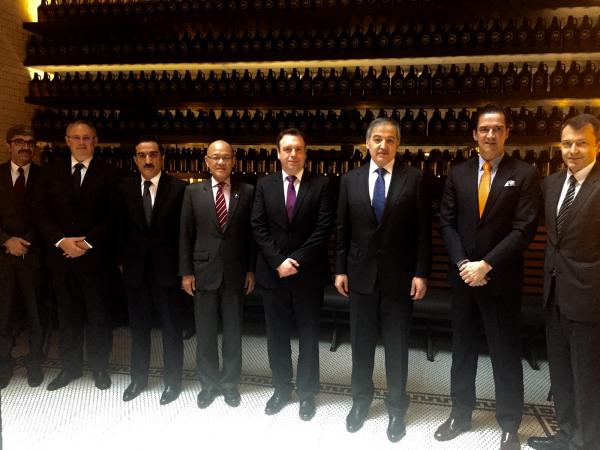
H.E. Ambassador Zsolt Hetesy, Deputy Permanent Representative of Hungary; H.E: Ambassador Mahmadamin Mahmadaminov, Permanent Representative of Tajikistan; H.E. Ambassador Virachai Plasai, Permanent Representative of Thailand; H.E. Ádám Zoltán Kovács, Deputy Secretary of State for international cooperation at the Ministry for Foreign Affairs and Trade of Hungary; H.E. Sirojidin Aslov, Foreign Minister of Tajikistan; H.E. Ambassador Kai Sauer , Permanent Representative of Finland; H.E: AmbasadorJürg Lauber, Permanent Representative of Switzerland
High-level official visit to the Netherlands
Ambassador Katalin Bogyay visited the Netherlands from 10 to 14 February 2016 to exchange views on peace, justice and development.
The high-level visit had the theme ‘Innovation and Sustainable Societies’. During the visit, Ambassador Bogyay has an audience with His Majesty King Willem-Alexander at Noordeinde Palace, and met with Prime Minister Mark Rutte and the Minister of Foreign Affairs of the Kingdom of the Netherlands, Mr Bert Koenders.
Participating UN Permanent Representatives had the opportunity to reflect on UN peace operations and discuss sustainable development with Mayors Mr Jozias van Aartsen of The Hague, and Mr Aboutaleb of Rotterdam.
Hungary pledges 90.000 US dollars to UNICEF core resources
Hungary supports and commends the hard work of UNICEF and the assistance it provides to children all over the world.
The Government of Hungary confirmed that Hungary has decided to make a contribution to UNICEF’s regular resources for the year 2016, in the amount of 25 million Hungarian forints, approximately 90.000 US dollars.
Thereby, Hungary maintains its level of contribution to the core resources from previous years.
The Astonishing New World of Medical Tourism
On 11 February 2016 the Permanent Mission of Hungary hosted UNA-NY’s booktalk event on Sasha Issenberg’s new book entitled Outpatients: The Astonishing New World of Medical Tourism, part of the Columbia Global Reports series.
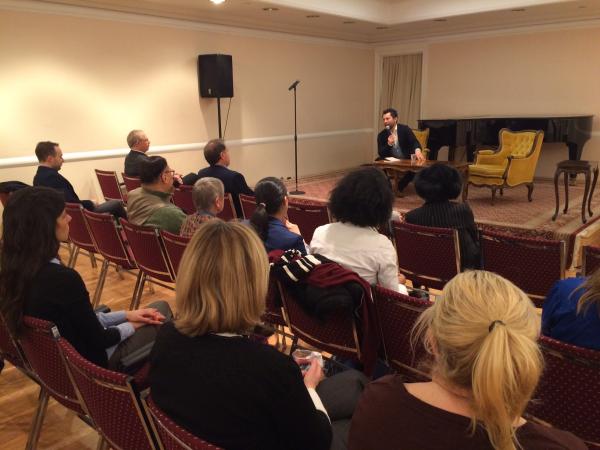
At the event, the author of Hungarian origin presented his book in which he investigates the global trends of medical tourism and whether it is the future of health care. In an increasingly globalized world, national governments may be losing control over the flows of money and information, but they still have responsibility for health care. Still, traveling abroad for medical care, once the province of the wealthy or desperate, is becoming commonplace as patients go in search of lower prices, and some countries have found economic opportunity in turning health care into a global business. As a case study the author tells the fascinating story of how Hungary builds a medical tourism business from scratch and markets it to the world to become Europe’s dental chair.
Is Security Council reform finally gaining traction?
The intergovernmental negotiations entered an exciting new phase on 3 February, when Member States started meaningful negotiations on the proposals concerning the relationship between the Security Council and the General Assembly. The debate showed more convergence than difference of opinions. While more controversial issues may await Member States, the momentum is building for moving ahead more decisively on the issue of reforms.
With the President of the General Assembly, H.E. Mogens Lykketoft (PGA) in attendance, H.E. Amb. Sylvie Lucas, Permanent Representative of Luxembourg, Chair of the IGN kicked off the 12th round of intergovernmental negotiations on 3 February.
For the first time, Member States have shown genuine willingness to discuss the substance of proposals compiled in the enhanced framework document of 31 July 2015. The first topic, namely the relationship between the Council and the General Assembly has drawn 50+ statements made by the countries, and all the negotiating groups (CARICOM, African States, L69, UfC, Arab States, G4 and Nordic Countries).
While still not engaged in text-based negotiations, favorable changes in the positions of the African Group, the UfC, Russia and China allowed Member States to find convergence of ideas and to start narrowing down differences.
In his statement H.E. Amb. Zsolt Hetesy, Deputy Permanent Representative expressed support for enhancing the relationship between the Council and all other relevant stakeholders. He also stressed that strengthening does not require Charter Amendment, while some steps can be taken even through simple implementation of existing rules. Since other fora and organs also deal with similar issues, the IGN should focus on the “big picture” while division of labor should be kept in mind.
Please find the full statement here.
Hungary was the co-organizer of this year's Holocaust Memorial Ceremony in the United Nations
On H.E. Ambassador Katalin Bogyay's initiative, Hungary was the co-organizer of the United Nations Holocaust Memorial Ceremony on the International Day of Commemoration in memory of the victims of the Holocaust, 27 January 2016.
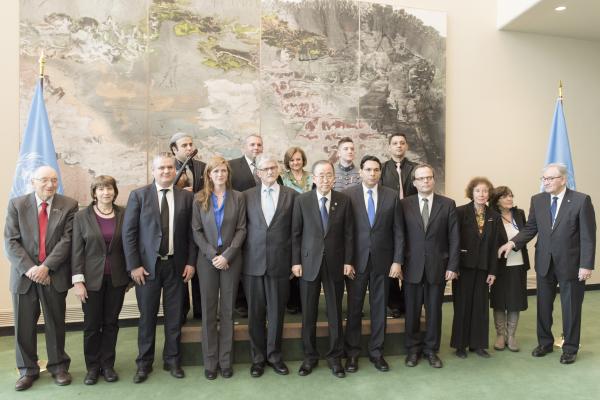
The theme of the commemoration this year was “the Holocaust and Human Dignity” and it was opened in this spirit by the remarks of Secretary-General Ban Ki-moon.
It is a privilege an honor, that for the first time in the existence of the International Holocaust Remembrance Alliance (IHRA), and under the Hungarian Chairmanship, the Chair of the organization was amongst the speakers at the United Nations celebration.
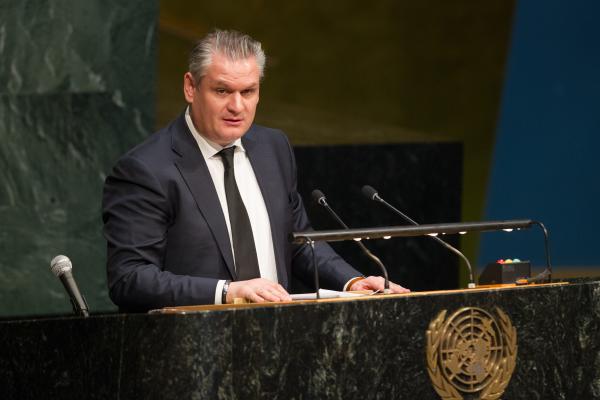
In his remarks, Mr. Szabolcs Takács, the Chair of IHRA drew the attention of the international community to the fact that this world-shattering event is the raison d’etre of the United Nations as well as of IHRA: the birth of both organizations was closely linked to the realization by state leaders that stable and institutionalized cooperation between states is fundamental in preventing another conflict such as the Second World War and another genocide such as the Holocaust. IHRA’s 31 member countries and ten observer countries work to take concrete steps to ensure that ‘never again’ is not just a platitude.
He furthermore emphasized the strong recognition of the Hungarian Government that every tenth victim of the Shoah, 600 thousand people, were Hungarians and that every Hungarian who killed or collaborated committed high treason against the Hungarian nation. The Chair echoed the Hungarian Government's principle of zero tolerance policy in connection with Anti-Semitism, a position that over the past year has been actively advocated by Ambassador Bogyay multiple times in front of every UN forum.
The Hungarian IHRA presidency's priority to raise awareness of the Roma Holocaust was beautifully reflected in the melodies of Roma musicians Antal Kopar (guitar) and Bela Horvath (violin) who played during the ceremony.
Invited speakers included H. E. Mr. Mogens Lykketoft, President of the seventieth session of the General Assembly; H.E. Mr. Danny Danon, Permanent Representative of Israel to the United Nations; H.E. Ms. Samantha Power, Permanent Representative of the United States to the United Nations and H.E. Mr. Felix Klein, Special Representative for relations with Jewish Organizations, issues relating to Anti-Semitism and Holocaust Remembrance.
Please find the full speech of Chair Takács here.
Building Trust: The Nexus to Preventing Violent Extremism
The Focal Point meeting the United Nations Alliance of Civilizations was held on 15 January in New York.
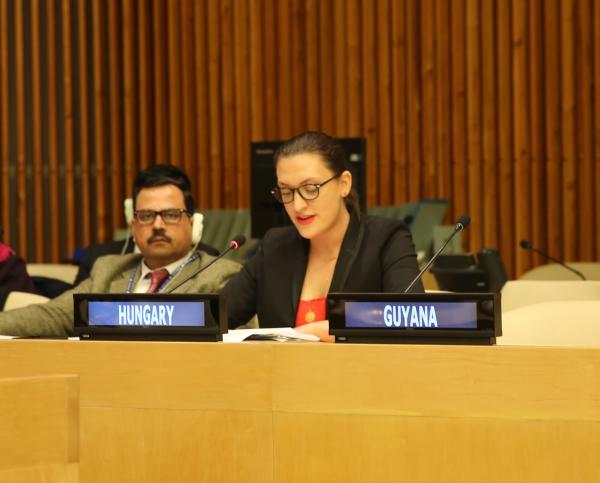
The session dedicated to preventing violent extremism was opened by the remarks of UNAOC High Representative to the UN, H.E. Al-Nasser. He emphasized that “we need to build bridges between societies [...] and to forge the collective political will to address the challenges we face."
Focal Points from all over the world discussed how the four pillars of the UNAOC (media, education, youth, migration) could work towards fostering tolerance and respect to prevent violent extremism.
In the national statement, Hungary emphasized that presenting an alternative to violent extremism is essential. The new narrative should be based on a culture of peace, mutual respect, religious tolerance, the appreciation of cultural diversity, and building an inclusive society, where human rights are respected.
The representative of Hungary welcomed UNAoC’s social media campaign against hate speech (#SpreadNoHate) and expressed strong support the intention of the Alliance to increase its role in mediation as a tool of preventive diplomacy.
Please find the full statement here.
Celebrating the 70th anniversary of the UN General Assembly
On 11 January 2016, the UN commemorated the 70th anniversary of the first meeting of the United Nations General Assembly ceremonial session.
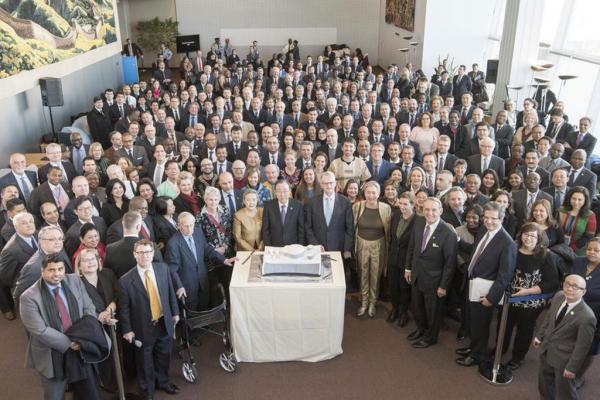
On 10 January 1946, 51 nations came together at Westminster Central Hall in London, England, and called to order the first meeting of the UN General Assembly. Sir Brian Urquhart, who participated at the meeting 70 years ago, participated in today’s celebration.
The Secretary General emphasized that the General Assembly is more important than ever, as he called on the international community to “follow the example of giants like Sir Brian Urquhart – by saving more lives, advancing more progress and promoting ever greater respect for human rights in our world.”
The President of the General Assembly, representatives of geographical groups and the host country made statements to mark the occasion.
“Réveillon de la Saint-Sylvestre” event hosted by Ambassador Katalin Bogyay
“We’re living in such harmony, playing so beautifully, we prove that we can live in peace. I wish politicians, left and right, could do the same.”
Inspired by the words of Sir Georg Solti, H.E. Ambassador Katalin Bogyay Permanent Representative of Hungary to the United Nations hosted a Salon de Réveillion on 30 December 2015, entitled Dialogue through Fashion and Music.
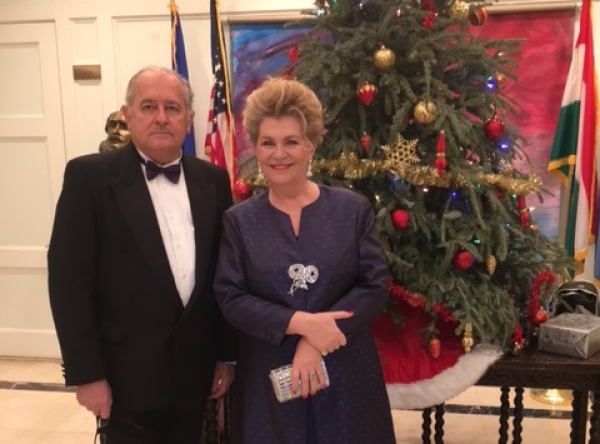
Referring back to the Salon D'Été and Salon D'Hiver, the aim of the event was to serve as a bridge between the New York artistic scene and the world of multilateral diplomacy in the United Nations, by introducing artists from different worlds and backgrounds, and to show politicians, time and time again, what real international cooperation is, by showing the kind of harmony that can be brought to life by artists.
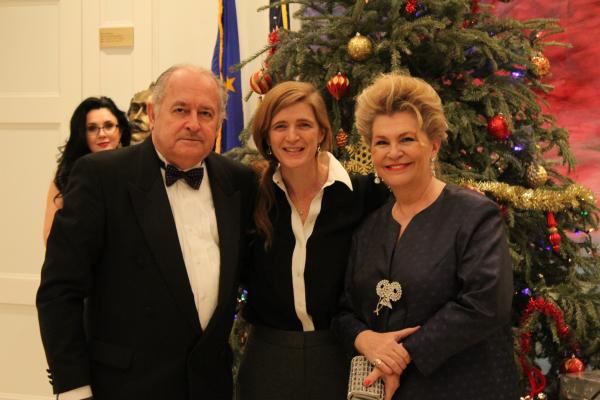
H.E. Ambassador Katalin Bogyay with spouse Dr. Tamás Lőrinczy and H.E. Ambassador Samantha Power, Permanent Representetive of the USA to the UN
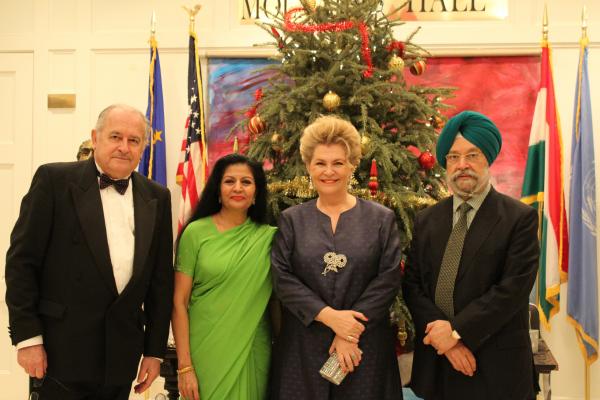
H.E. Ambassador Katalin Bogyay with spouse Dr. Tamás Lőrinczy and Lakshmi Puri, Assistant Secretary-General for Intergovernmental Support and Strategic Partnerships at UN WOMEN and her spouse Hardeep Singh Puri, former Permanent Representative of India to the UN
As a celebration of New Year’s Eve and reflecting back on the achivements of 2015, at this particular Salon Ambassador Bogyay introduced the new Opera, Bonfire of the Vanities, by the Hungarian born Stefania de Kenessey, based on the novel by Tom Wolfe, young artists of Juilliard performed operetta arias.
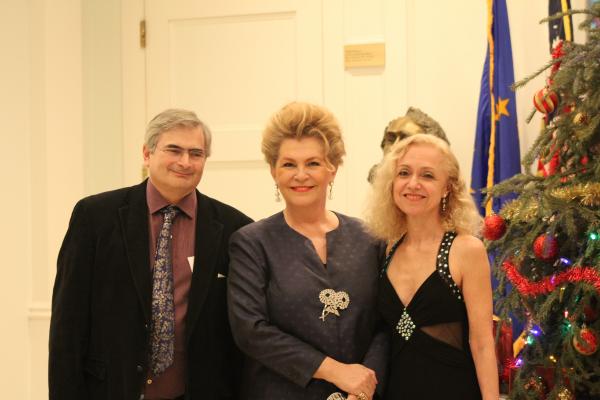
H.E. Ambassador Katalin Bogyay with Stefania de Kenessey and Michael Bergmann
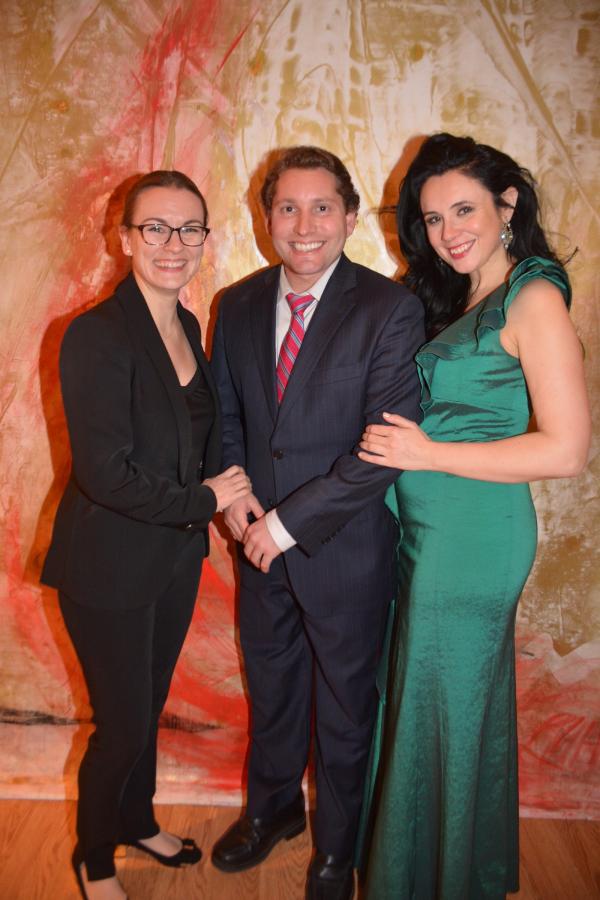
Daniela Candillari, piano; Robert Balonek, baritone; Jasmina Halimic, soprano
As a tribute to cultural diversity, celebrated fashion designer Victor de Souza composed an exhibit of living sculptures for especially for this occasion. In his remarks he emphasized the importance of intercultural dialogue.
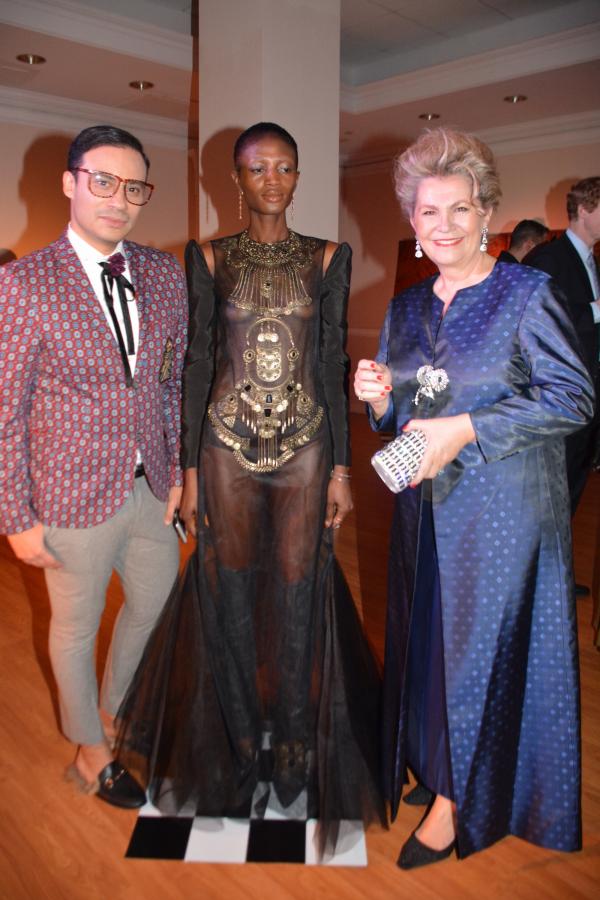
H.E. Ambassador Katalin Bogyay with Viktor deSouza
For media coverage please please see the articles below:
- New York Evening Hourse by Lieba Nesis
- De Souza Delivers
- Pre-Sylvester Night Festive Dinner
To see the photo diary of the event, please click here.
Hungarian Participation at the ECOSOC Youth Forum
Dr Boglárka Illés, Deputy State Secretary for Youth Affairs and Equal Opportunities represented Hungary at the 2017 ECOSOC Youth Forum.
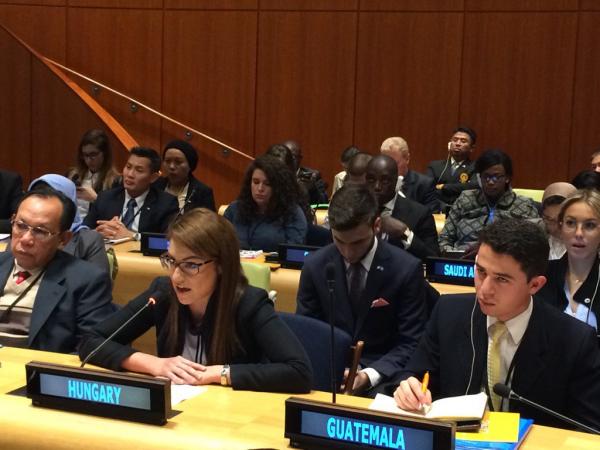
Addressing the interactive ministerial plenary panel, Ms Illés presented successful Hungarian policies aimed at promoting youth employment. On the margins of the Forum, she participated in several side events, focusing on regional challenges of youth policy and political participation of the youth, among others. She held a fruitful discussion with a group of UN Youth Delegates, listening to their experiences and proposals, and sharing Hungarian best practices and frameworks for youth engagement in policy- and decision-making.
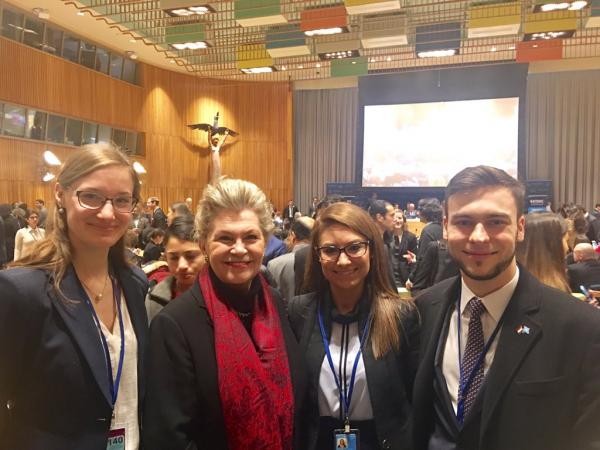
Hungarian UN Youth Delegate András Volom also actively participated at the Forum.
To read the full speech of the Deputy State Secretary, please click here.
Intervention by Ambassador Bogyay on Question of equitable representation on and increase in the membership of the SC
Excellencies, Dear Co-Facilitators,
Dear Colleagues,
Let me again congratulate to the two newly appointed Co-chairs, Ambassador Khiari and Ambassador Jinga. Hungary as a long-time supporter of the Security Council reform supports open dialogue, - as always - looks for common ground, brave and win-win compositions. We support the distinguished Co-chairs in their noble wish and commitment to moving forward the process.
We reiterate that a strong and representative Council is needed. Without a strong and representative Council, this Organization, we Member States, will not be able to reach the goal set by the Secretary General: to make 2017 'a year for peace'.
A reformed Council is better suited to address challenges and opportunities of the evolving geopolitical and security landscape. Naturally, any meaningful reform requires the political will and active engagement of the P5. That is in the interest of all stakeholders or could be tweaked to result in a win-win situation. Hungary as an active member of the ACT Group supports all efforts in this regard.
We need a reasonably ambitious but realistic agenda, with result-oriented practical discussions in all five clusters.We should not get caught in a loop of repeating the same IGN session over and over again – the results achieved must be clearly passed on to the next Assembly as concrete proposals. Hungary is looking forward receiving the work program and the schedule of the sessions of the IGN from the Co-Chairs.
Excellencies,
Let me now underline a few general points of the Hungarian position as far as the five clusters are concerned.
As regards the relationship between the Security Council and the General Assembly and the size of an enlarged Council and its working methods, the convergences emerged have to be transformed into proposals soon in order to energize the reform process. We reiterate our call for clear and detailed rules on the Council’s coordination and cooperation with the main organs of the UN, member states and other stakeholders. The integrated nature of today’s threats and the need to come up with lasting solutions evidently requires that.
Taking into account the debates on the size and configuration of the Security Council, the main convergence is perhaps that enlargement is timely and warranted. Hungary continues to support the enlargement of the Security Council in both permanent and non-permanent categories, while at the same time we are ready to examine all practical proposals aiming for interim solutions as well.
Enlargement must be based on the regional groups and on their equitable geographical representation. We call for a second non-permanent seat for the Eastern European Group, which requests stands under any enlargement model. Enlargement will necessarily mandate an overhaul of the Security Council’s working methods. We witnessed positive developments in this field, the work done by –among others – New Zealand, Uruguay or recently Sweden should be built upon.
Last year the question of veto emerged as a possible stumbling block for further progress, but even here the divergent views can also be crystalized around main options. A consolidated text would assist us in moving closer to find compromise solutions. We are encouraged by the growing support of member states for the ACT Group’s Code of Conduct to prevent or stop atrocity crimes as well as for the French-Mexican proposal on the voluntary restraint of veto power. The practical implementation of these two proposals is not tied to the reform process, but must be pursued by the Council every occasion.
Dear Co-Chairs,
We look forward to further discussing the specific issues of the process and wish you good luck with consolidating the proposals of Member States into a compromised document. I thank you for your attention.
Excellencies, Dear Co-Facilitators,
Dear Colleagues,
Let me again congratulate to the two newly appointed Co-chairs, Ambassador Khiari and Ambassador Jinga. Hungary as a long-time supporter of the Security Council reform supports open dialogue, - as always - looks for common ground, brave and win-win compositions. We support the distinguished Co-chairs in their noble wish and commitment to moving forward the process.
We reiterate that a strong and representative Council is needed. Without a strong and representative Council, this Organization, we Member States, will not be able to reach the goal set by the Secretary General: to make 2017 'a year for peace'.
A reformed Council is better suited to address challenges and opportunities of the evolving geopolitical and security landscape. Naturally, any meaningful reform requires the political will and active engagement of the P5. That is in the interest of all stakeholders or could be tweaked to result in a win-win situation. Hungary as an active member of the ACT Group supports all efforts in this regard.
We need a reasonably ambitious but realistic agenda, with result-oriented practical discussions in all five clusters.We should not get caught in a loop of repeating the same IGN session over and over again – the results achieved must be clearly passed on to the next Assembly as concrete proposals. Hungary is looking forward receiving the work program and the schedule of the sessions of the IGN from the Co-Chairs.
Excellencies,
Let me now underline a few general points of the Hungarian position as far as the five clusters are concerned.
As regards the relationship between the Security Council and the General Assembly and the size of an enlarged Council and its working methods, the convergences emerged have to be transformed into proposals soon in order to energize the reform process. We reiterate our call for clear and detailed rules on the Council’s coordination and cooperation with the main organs of the UN, member states and other stakeholders. The integrated nature of today’s threats and the need to come up with lasting solutions evidently requires that.
Taking into account the debates on the size and configuration of the Security Council, the main convergence is perhaps that enlargement is timely and warranted. Hungary continues to support the enlargement of the Security Council in both permanent and non-permanent categories, while at the same time we are ready to examine all practical proposals aiming for interim solutions as well.
Enlargement must be based on the regional groups and on their equitable geographical representation. We call for a second non-permanent seat for the Eastern European Group, which requests stands under any enlargement model. Enlargement will necessarily mandate an overhaul of the Security Council’s working methods. We witnessed positive developments in this field, the work done by –among others – New Zealand, Uruguay or recently Sweden should be built upon.
Last year the question of veto emerged as a possible stumbling block for further progress, but even here the divergent views can also be crystalized around main options. A consolidated text would assist us in moving closer to find compromise solutions. We are encouraged by the growing support of member states for the ACT Group’s Code of Conduct to prevent or stop atrocity crimes as well as for the French-Mexican proposal on the voluntary restraint of veto power. The practical implementation of these two proposals is not tied to the reform process, but must be pursued by the Council every occasion.
Dear Co-Chairs,
We look forward to further discussing the specific issues of the process and wish you good luck with consolidating the proposals of Member States into a compromised document.
I thank you for your attention.
Kick off debate on the Security Council reform
The first informal debate of this years’ round of the Intergovernmental Negotiations (IGN) on the question of equitable representation and increase in the membership of the Security Council took place today in the United Nations Trusteeship Council. As a long-time, supporter of the SC reform process H.E. Katalin Bogyay permanent representative of Hungary reiterated that there is a need for a strong and representative Council. Hungary remains convinced that a realistic reform, a win-win solution can be reached through open dialogue.
H.E. Mr. Peter Thomson President of the 71st session of the UN General Assembly opened the debate facilitated by the two Co-Chairs, Ambassador Mohamed Khaled Khiari and Ambassador Ion Jinga. During the discussion H.E. Katalin Bogyay permanent representative expressed the well-known position of Hungary concerning all the five clusters of the reform process. She called for a clear work program for this session that will enable the membership to further discuss specific details of the reform and to reach the goal of starting the long-overdue text based negotiations.
To see the full statement of the Ambassador, please click here.
Lunch in honor of the Permanent Representatives of 2015
On 17 December 2015, H.E. Ambassador Katalin Bogyay, Permanent Representative of Hungary to the UN participated at the lunch in honor of the Class of 2015 Permanent Representatives at the Residence of H.E. Ambassador Gillian Bird, Permanent Representative of Australia to the UN.
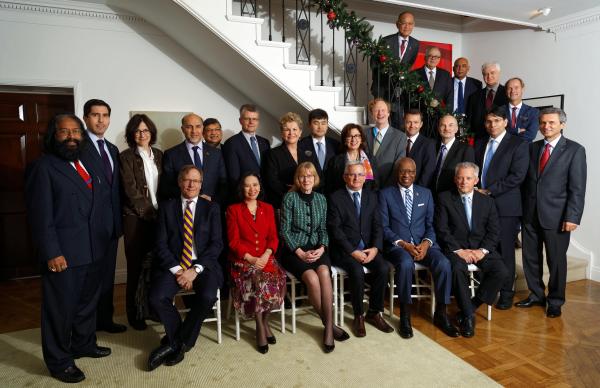
Following her post as Permanent Representative of Hungary to the UNESCO, Ambassador Bogyay presented her credentials to His Excellency, Secretary General Ban Ki-moon on 20 January 2015.
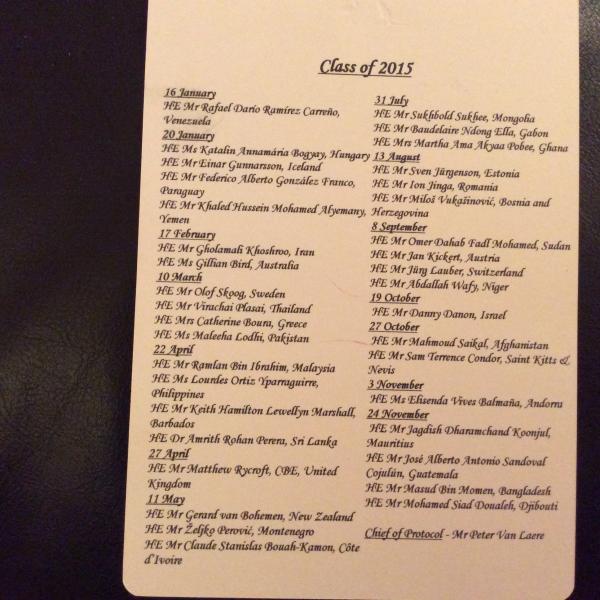
Keynote speech by Ambassador Bogyay at the 8th Human Rights forum
Keynote Speech by H.E. Ambassador. Katalin Bogyay, Permanent Representative of Hungary to the United Nations at the 8th Budapest Human Rights Forum, on 12 November 2015.
Excellencies,
Distinguished Participants,
Ladies and Gentlemen,
It is a great pleasure for me to participate as a keynote speaker in the Eighth Budapest Human Rights Forum. Over the past 8 years, the Budapest Human Rights Forum has established itself as an important venue for the exchange of ideas among diplomats, representatives of international organizations, the academia and civil society. The Forum provides an excellent opportunity to delve deeper into important human rights topics that are high on the international community’s agenda.
This year’s Forum marks the 70th anniversary of the establishment of the United Nations and will focus on the unique contribution of the world organization to the protection and promotion of human rights worldwide. Over the next two days, you will have the opportunity to listen to thought provoking discussions on topics ranging from the participation of minorities in media to sustainable development.
Human Rights and Sustainable Development
On 25th September, world leaders adopted the 2030 Agenda on Sustainable Development in which they envisaged a world of universal respect for human rights and human dignity, the rule of law, justice, equality and non-discrimination; and of equal opportunity permitting the full realization of human potential.
In other words, world leaders recognized that human rights and the rule of law are enablers of sustainable development. As many recent examples have shown, without the respect for human rights and fundamental freedoms, there is no hope for durable peace and development.
The 2030 Agenda is a groundbreaking instrument, which charts an ambitious path for humanity over the next 15 years. The goals and targets of the Agenda reflect the universality and indivisibility of all human rights by addressing both freedom from fear and freedom from want.
The Agenda promises “more peaceful, just and inclusive societies which are free from fear and violence” with attention to democratic governance, rule of law, access to justice and the protection of fundamental freedoms.
The Agenda also places the human rights principles of equality and non-discrimination at the center of sustainable development efforts by calling for a just, equitable and socially inclusive world in which the needs of the most vulnerable are met.
In the past, development efforts often left the poorest and most marginalized increasingly far behind. The new Agenda strives to leave no-one behind by fighting inequality and reaching the most vulnerable segments of society.
The Agenda also reaffirms the responsibilities of States to “respect, protect and promote human rights without distinction of any kind as to race, colour, sex, language, religion, political or other opinions, national and social origin, property, birth, disability or other status.”
By adopting the new Agenda, world leaders envisaged a world, which invests in its children and in which every child grows up free from violence and exploitation. A world in which every woman and girl enjoys full gender equality.
Hungary actively supported the efforts to create a human rights based approach in the new Agenda and to ensure that the rights and needs of vulnerable groups, including women, children, indigenous people and persons with disabilities, are fully incorporated in its goals and targets.
The Agenda is a milestone also in the process of empowering women. It includes a stand-alone goal and many cross-cutting targets on gender equality and the empowerment of women which call for the elimination of all forms of violence against women and girls, the elimination of child, early and forced marriage and women’s equal opportunities for leadership, among others.
The Agenda also aims to provide children with a nurturing environment for the full realization of their rights by ensuring their right to education, reducing child mortality, prohibiting child labor and the recruitment of child soldiers, among other important targets.
To create a truly inclusive society as envisaged by the 2030 Agenda, States must also protect the rights of persons with disabilities. The Agenda sets out to empower persons with disabilities by ensuring their access to education, vocational training, promoting their employment, and creating accessible cities.
Most importantly, the Agenda recognizes children and young people as critical agents of change. By adopting this new framework, we recognized that the future of humanity and of our planet lies in our hands and in the hands of today’s younger generation who will “pass the torch to future generations”. We must ensure that they can live up to their full potential by ensuring that the ambitious goals and targets are implemented effectively over the next 15 years.
Ladies and Gentlemen,
In my speech today, I will focus on two important issues that are close to my heart: the protection of human rights of women and children.
Gender equality and women’s empowerment
This year, we are celebrating two important anniversaries relating to women’s rights. 20 years ago, participants at the Fourth World Conference on Women adopted the Beijing Declaration and Platform for Action, a landmark document in the promotion of gender equality and women’s empowerment, which remains as relevant today as 2 decades ago. The Beijing Declaration is the most comprehensive document, which recognized the human rights of women and girls, and it continues to guide our global efforts to advance gender equality around the world. Since 1995, much has been achieved, but progress has been slow and uneven.
In order to accelerate progress, UN Women launched its new campaign called “Step it up” to ensure that women and girls have equal opportunities and rights by 2030. Hungary joined the campaign and pledged commitments in three priority areas: efforts to combat domestic violence, the promotion of women’s economic empowerment, and support for international efforts aimed at ending sexual violence in conflict.
In order to effectively combat domestic violence, Hungary pledged to prioritize prevention efforts, with a special emphasis on awareness raising among young people. New initiatives to ensure the protection of victims are also underway, by increasing the necessary number of shelters for survivors of domestic violence and by providing trainings for professionals who encounter domestic violence, with a special focus on professionals working in child protection services.
Hungary is also committed to improving the economic status of women by increasing their employment and implementing more flexible daycare options in order to help reconcile work and family life. We believe that efforts aimed at gender equality and the strengthening of families are mutually reinforcing and not inherently opposed as some argue. Our policies are guided by the objective of ensuring that women can fulfill their potential in all spheres of life. We will continue to work with our partners in international fora to promote an honest and constructive dialogue on these issues.
Hungary is also strongly committed to international initiatives aimed at combatting sexual violence against women and girls in conflict. Women and girls continue to suffer disproportionately from the effects of armed conflict. They are often the targets of sexual violence, abuse, sexual slavery, child and forced marriage, and other serious violations of their human rights.
15 years ago, the Security Council adopted Resolution 1325 on “Women, peace and security” which recognized the crucial contribution of women to peace processes and the need for their protection in situations of armed conflict. A lot has been achieved since 2000: sexual violence in conflict has been recognized as a tactic of war and now constitutes a war crime, women’s participation in peace processes has increased, and the number of senior women leaders within the UN has been on the rise—from special envoys of the Secretary-General, to the appointment of the first female commander of a UN peacekeeping mission in Cyprus.
Despite the remarkable progress made over the last 15 years, significant challenges remain which hinder the full realization of the goals set out in 2000.
With regard to sexual violence in conflict, few perpetrators are ever held accountable, making little difference for women and girls on the ground. Hungary supports greater emphasis on ensuring that perpetrators of serious crimes against women are held accountable. Accountability plays an important role not only in ensuring justice for the victims, but also in healing the wounds of traumatized societies.
New challenges have also emerged, most notably the rise of violent extremists groups, like ISIS. In his latest annual report, the Secretary General gave a detailed account of the horrific crimes committed by ISIS, including reports of rape, mass abduction, forced marriage, forced prostitution and stoning of women for alleged adultery.
The primary targets of these horrendous crimes were women and girls belonging to religious minorities, including Christians, Yazidis and other faiths. Hungary strongly condemns the crimes committed by ISIS against women belonging to religious minorities. We must not forget about these crimes against humanity and urge the International Criminal Court to investigate and punish the perpetrators of these brutal crimes.
We also need more meaningful participation of women in peace talks to achieve sustainable peace around the world. Women continue to be marginalized in peace negotiations even when they can participate. By letting half of the population's voice being unheard; it is impossible to build societies based on inclusion and justice.
A few weeks ago, the Security Council held a High-Level Review of its resolution 1325 to reflect on the implementation of the women, peace and security agenda, and to make concrete and ambitious commitments to its full realization. At the meeting, Hungary pledged to identify and deploy female military experts, officers and police officers to UN peacekeeping and EU Common Security and Defense Policy missions.
Hungary also co-sponsored a new resolution adopted at the high-level meeting, which calls for targeted sanctions against actors who have committed sexual or gender-based violence and requests the UN to conduct research on the drivers of radicalization for women. This is a very urgent task as many young women and girls are lured by extremist groups to fight in conflict situations.
As we look ahead to creating a more sustainable, inclusive and peaceful world, we must ensure that the potential of half of the world’s population is fully realized. When we empower women and girls, we achieve a better and more sustainable future for all.
Children
In the same vein, we must ensure that children affected by armed conflict receive full protection. War destroys the lives of millions of children and their families around the world. Children affected by conflict spend years, if not their entire lives, recovering from the trauma of war. Their wounds are not only physical, but also emotional.
As the Secretary-General has highlighted in his latest briefings on this issue, 2014 has been the worst year for children affected by conflict.
The abduction by Boko Haram of hundreds of girls from their schools in Nigeria is a shocking example of the group’s brutal tactics and total disregard for basic human rights. Targeted attacks against schools have serious repercussions on the right to education of children. I believe that education is a crucial factor in countering the extremist narrative of these groups and reducing the risk of radicalization for young people.
Despite these daunting challenges, there are also important achievements to celebrate. The International Criminal Court issued its first ever sentence in 2012 against Thomas Lubanga for the crime of recruiting child soldiers. This case stands as a glimmer of hope in the culture of impunity that surrounds the serious crimes committed against women and children in armed conflicts. The “Children, Not Soldiers” campaign, launched UNICEF and the Special Representative of the Secretary-General, has also achieved steady progress during its first year.
The protection of children plays an important role in Hungary’s human rights policy and international efforts. Over the last few years, we have supported several projects aimed at helping children affected by humanitarian crises, including in Pakistan, Afghanistan, Syria, the Central African Republic and Sudan.
In Hungary, we have implemented several measures to promote the rights of children, including in the areas child friendly justice, education, health care and the fight against poverty for children in vulnerable situations.
We are strong supporters of UNICEF’s activities in providing assistance to children all over the world, and are proud that the organization decided to establish its new Global Shared Services Center in Budapest. By hosting the new Center, Hungary effectively contributes to the reduction of UNICEF’s administrative costs, which can be used to fund the important life-saving work of the Organization.
Minorities
Ladies and Gentlemen,
The third panel discussion of this year’s Forum will deal with the situation of minorities in media. Promoting the rights of national, ethnic, religious and linguistic minorities is a priority area for Hungary’s engagement in international and regional organisations. We are active supporters of the mandate of the UN Special Rapporteur on Minority Issues and the work of the UN Forum on Minority Issues, held annually in Geneva.
On the basis of its own historical experience, Hungary strongly believes that the promotion and protection of minority rights contribute to political and social stability and peace. We believe that, when the individual and collective rights of minorities are safeguarded by law and protected by government authorities, and when minorities are accepted and respected by the majority of society, they can efficiently contribute to both internal stability and international peace and security.
In this context, Hungary is deeply concerned by the increased violence targeting religious minorities in several conflict situations. As noted earlier, we are particularly troubled by the brutal attacks committed by violent extremist groups, like ISIS, against Christian and other minorities. These atrocities and serious crimes must be investigated, and perpetrators must be held accountable.
In Hungary, the rights of minorities are guaranteed by the Fundamental Law (Constitution), the Cardinal Act on Nationalities and Criminal Code. These pieces of legislation ensure a solid legal basis to prevent violence or atrocity crimes against minorities, to protect minorities and also to punish crimes committed against them.
We believe that the implementation of the 2030 Agenda for Sustainable Development can only be successful if the human rights of minorities are protected, and their needs are taken into account in line with the principle of leaving no-one behind.
Ladies and Gentlemen,
Over the next 2 days, you will be discussing these and many other important human rights issues affecting our world today. I wish you all an interesting and fruitful discussion.
Thank you.
Security Council holds first ever meeting on trafficking in persons during conflict
On 16 December, the UN Security Council held a thematic debate on trafficking in persons in conflict situations by terrorist and armed groups such as ISIL, Boko Haram, and the Lord’s Resistance Army. H. E. Ambassador Katalin Bogyay, Permanent Representative of Hungary to the UN participated in the meeting and met Nadia Murad Basee, an Iraqi woman of the Yazidi faith, who was held captive by ISIS and shared her story in the UN.
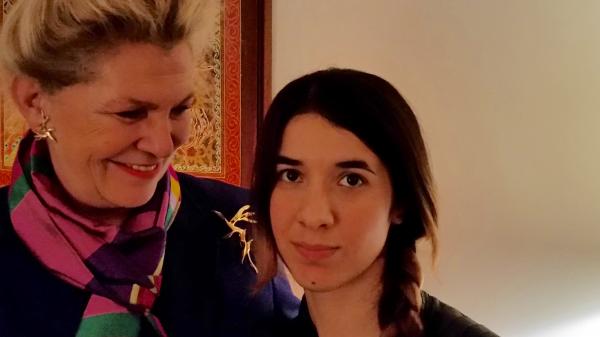
The first ever UN Security Council meeting on human trafficking was organized on the initiative of the US Presidency of the Council. In his briefing, Deputy Secretary-General Jan Eliasson highlighted that human trafficking is the slavery of the modern age. As of today, millions live in slavery or under slave like conditions and most of the victims are women and children. Thousands of Yazidi women were abducted by ISIS and kept as slaves which may amount to war crimes and crimes against humanity.
Nadia Murad Basee, an Iraqi woman of the Yazidi faith shared her story of being trafficked by ISIS following the 2014 assault on her hometown in Iraq. She witnessed women and girls being sold into sexual slavery and young boys being forced to convert to Islam and to fight for ISIS forces.
Yury Fedotov, the Executive Director of the UN Office of Drugs and Crime (UNODC), highlighted that there was a strong international legal framework dealing with the fight against human trafficking which needs to be implemented more effectively by Member States.
A presidential statement was adopted during the briefing. The statement condemns in the strongest terms reported instances of trafficking in persons in areas affected by armed conflict and deplores all acts of trafficking in persons undertaken by ISIS and other terrorist or armed groups, including Boko Haram. The statement also requests a report from the Secretary-General within a year on progress made in better implementing existing mechanisms for countering trafficking in persons.
H.E. Ambassador Katalin Bogyay, Permanent Representative of Hungary to the UN participated in the meeting and met Yazidi survivor Nadia Murad Basee at a dinner hosted by the Honorable Michele J. Sison, Deputy Permanent Representative of the United States to the United Nations.
Members of the Hungarian Parliament participate at Inter-Parliamentary Union hearing
Members of the Hungarian Parliament Mónika Bartos, Erzsébet Schmuck and Head of Hungarian Parliament’s IPU Secretariat Katalin Somfainé Ádám participated at the United Nations Inter-Parliamentary Union Hearing at the UN Headquarters, New York, on 14 February 2017.
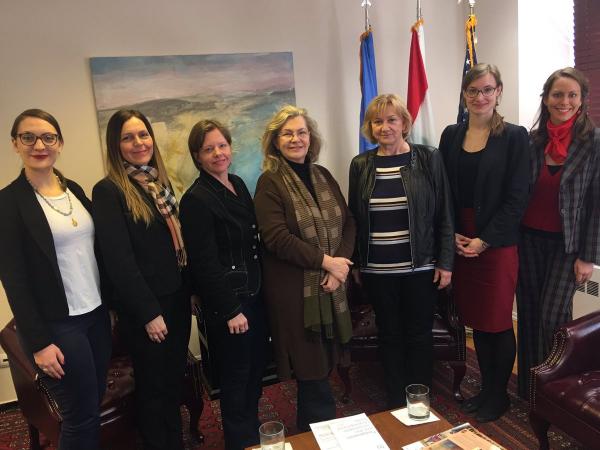
The Hearing, co-organized by the Inter-Parliamentary Union (IPU) and the Office of the President of the General Assembly, was devoted to the theme of “A World of Blue: Preserving the oceans, safeguarding the planet, ensuring human well-being in the context of the 2030 Agenda”.
The session opened by Mr. Saber Chowdhury, President of the Inter-Parliamentary Union and Peter Thomson, President of the General Assembly gathered representatives of national and regional parliaments around the globe.
The hearing provided opportunity to exchange views about the role of parliamentarians in achieving sustainable social and economic development, along with environmental protection and the fight against climate change linked to the preparatory process of the United Nations Conference to support the implementation of Sustainable Development Goal 14 on conserving and using oceans, seas and marine resources sustainably for development. The conference shall address the contribution of Goal 14 to the realization of Agenda 2030 as a whole on 5-9th June 2017.
On the occasion of the event, H.E. Ambassador Katalin Bogyay, Permanent Representative of Hungary to the United Nations received the parliamentary delegation for an exchange of views on the role of the Parliament and women MPs in raising awareness and gathering public support to the implementation of the sustainability agenda.
Statement by Ambassador Bogyay on the occasion of the Second Commemoration of the International Day of Women and Girls in Science
Statement by H.E. Ambassador Katalin Bogyay at the panel discussion “Development Cooperation Perspective on the Role of Women in Science and Media in Implementing the SDGs” on the occasion of the Second Commemoration of the International Day of Women and Girls in Science, 10 February 2017.
Your Excellencies,
Distinguished Panelists and Colleagues,
Dear Ladies and Gentlemen,
As a women diplomat, former journalist and a professional who worked extensively in and with the media for many years, a strong supporter of gender equality and women’s empowerment, and as a firm believer in the power of science, I am honoured to speak at today’s commemoration day.
Science is an integral part of Agenda 2030, and we welcome that the multi-stakeholder Forum on Science Technology and Innovation for the SDGs should strengthen the science-policy interface. The most important difference compared to the MDGs and at the same time the largest challenge and opportunity lies in bringing together the implementation of science-related goals with gender equality and the empowerment of women and girls.
The SDGs set out investing in women especially in the areas of education health and employability Still , women today lack equal access to and participation in the political, economic, public, cultural and also scientific field, including qualification, employment, remuneration, career opportunities, decision-making and leadership.
However the empowerment of women and girls is an essential contribution to sustainability at all stages of development, including from emergency relief, through conflict resolution, recovery, peacekeeping and peace-building. The ability of women to achieve behavioural change and cultural shift is the greatest potential for sustainable social development and inclusive economic growth.
In science, a significant gender gap persists all over the world, including in technology, engineering and mathematics (STEM). According to the most recent UNESCO Science Report, women account for only 28% of researchers across the world. Gender equality in STEM is not only a matter of fairness. The untapped potential of brilliant girls and women is a great loss of opportunity, both for women themselves and for the society as a whole. Gender equality should therefore be considered as a crucial means to promote scientific and technological excellence.
Obstacles that women have to face are threefold: women have to face negative stereotypes, a considerable gender pay gap, and also social expectations that negatively influence their career choices, including the need for balancing family and career, fitting into the existing social structure, or simply the lack of self-confidence. Therefore, it is of utmost importance to break through gender stereotypes in the fields dominated by males, such as science and technology.
The media are powerful tools in this regard. The messages they transmit change or reinforce perceptions, social behaviour, and shape values and preferences. Distortions of reality and imbalanced coverage, including on women and their perspectives, constitutes a barrier to their empowerment. Women politicians, for example, in many countries, are under-represented in news during election campaign, and women are too often represented as victims or celebrities. Even in the media sector itself, very few women are editors or columnists, and they face more obstacles in advancing their career.
In this regard, we appreciate and support UN Women in raising awareness of gender equality among the members of the media through special workshops and toolkits.
When used wisely, media can also be a powerful tool in showing women examples of success. Through the creation of role models, media is able to encourage women and girls to act proactively and stand up for their rights. Recognising this potential, during the European Year of Development in 2015, the Hungarian Ministry of Foreign Affairs and Trade appointed well-known women among our media celebrities as goodwill Ambassadors (singer Sena Dagadu and reporter Al Ghaoui Hesna) to promote women’s empowerment.
Awareness-raising should start as early as possible, in the kindergardens, primary and secondary schools. The Girls’ Day initiative, launched in Hungary in 2012 by the Association of Hungarian Women in Science (Nők a Tudományban Egyesület, NaTE), aims to attract female high school students towards natural science and technology with the aim of redoubling the ratio of female students graduating from the technology, engineering and natural sciences faculties by 2020. Last year, 1600 female high school students visited 57 collaborating scientific institutions - university labs, research institutions, private companies throughout Hungary in the framework of this programme.
Promoting gender equality should continue in the higher education as well. The scholarship programme called Stipendium Hungaricum is Hungary’s most important bilateral development cooperation programme promoting equal chances for education and development through providing access to higher education institutes for students from developing partner countries. We are happy to see that every year, there is a significant number of female applicants.
Now let us turn to examine the perspectives of women in scientific institutions.
According to the 2015 UNESCO World Science Report, in Hungary, the ratio of women in science is about 34,9%.
The Hungarian National Strategy for the Promotion of Gender Equality for 2010-2021 sets out that the percentage of women in leadership positions should reach at least 40% in Hungary by 2021. TheNational Research-development and Innovation Strategy for the period 2013-2020, entitled “Investment in the Future”, establishes the priority of creating equal opportunities for women in the Research, Development and Innovation sector.
Let me share some best practices from Hungary is this regard.
At the Hungarian Academy of Sciences, the most prominent scientific institution in the country, assembling the most excellent researchers from all fields of science, the rate of female members has never exceeded 5-6%. In order to change this ratio, a new body called the Women in Research Careers Presidential Commission was established within the Academy in January 2017, aiming to increase the proportion of women among professors and doctors and to increase girls’ interest in natural sciences.
Another reknown initiative is the World Science Forum, launched by the Hungarian Academy of Sciences, UNESCO and the International Council for Science. The Forum brings together international policy makers, scientists, and among them, many talented ad successful women, to discuss global challenges from scientific, political and economic aspects. The declaration entitled „The Enabling Power of Science”, adopted by the Forum in 2015, reflects the main goals of Agenda 2030, and underlines the importance of empowering women scientists to improve the governance of science, as well as the equitable participation of women in the practice and application of science.
Another example of efforts made to increase gender equality in scientific life is the Association of Hungarian Women in Science, a national network of researchers, professors, and engineers supporting the advancement of women, increasing their participation in the scientific field and shaping public opinion in a positive way.
The Association organizes programmes, assists individuals and organizations in writing tenders, and distributes awards to women showing excellent performance in their field of research. An example for their work is a project run together with the American Association of University Women, that enables female students to visit and get inspiration from local STEM companies. An award called the Excellence Award (“Kiválóság Díj”) is accorded each year by the Association to three female scientists in materials technology, biotechnology and space technology, with a special section for a female Roma researcher.
Since 2010, the Seadrop Prize (“Tengercsepp Díj”) is awarded annually by the Faculty of Natural Sciences at the Eszterházy Károly College, in Eger, to female professors who have demonstrated outstanding achievement in teaching, professional results, talent support, project initiation or innovation.
Recognition of women’s success and talent management is also pivotal in achieving women’s empowerment, and partnership with the private sector is indispensable in this regard. The joint Programme of L’Oréal and UNESCO for Women in Science, for instance, plays an important role in highlighting the achievements of women in their early career. We are proud of Doctor Eszter Farkas, awarded the L’Oréal UNESCO International Rising Talents grant in 2016 in the category of technology and engineering.
In conclusion, enabling women to fulfil their full potential in the scientific field is central to achieving gender equality and women’s empowerment, and thereby increasing their contribution to social and economic development. I equally believe that we cannot achieve sustainable development in the long run, if we do not lift culture as the fourth pillar of the Agenda 2030, beside economic prosperity, social advancement and environmental protection.
This will need multi-stakeholder partnership with media, civil society, private sector and all relevant umbrella organizations.
I hope that I inspired all of you by these best practices, and I am convinced that the distinguished audience and my fellow speakers present here today are well placed to make this happen.
Let’s stand together and act for women and girl’s future in science and their contribution to sustainable development.
I thank you for your kind attention!
Remembering Russian Ambassador Vitaly Churkin
The Russian ambassador to the United Nations, Vitaly Ivanovich Churkin, died in New York on 20 February 2017. Following is the statement by Ambassador Bogyay on the occasion of his sudden death.
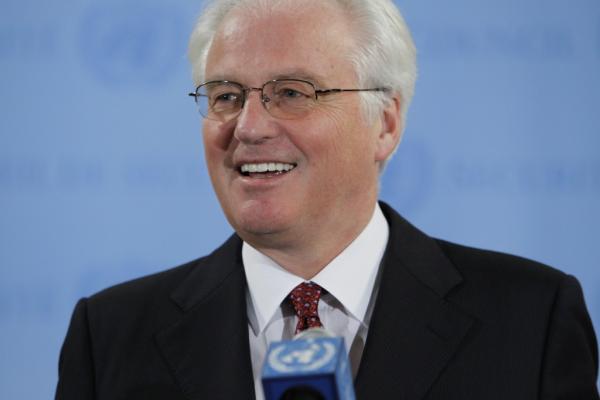
Ambassador Churkin was not only a magician of diplomacy, full of knowledge and understanding, but a man with passion, big heart, great intelligence, elegance, lover of art and beauty, a brilliant raconteur with a great sense of humor. His energy was able to move mountains. He was one of the key witnesses and active players of modern times.
And before anything he was a gentle and loving family man and friend.
My deep sympathy and condolences go to his wife, Irina, his children: Anastasia, Maksim and to his country.
He left his sign behind.
The UN family will mourn and remember him.
Intervention by Ambassador Bogyay on the Revitalization of the work of the General Assembly
Intervention by H.E. Ambassador Katalin Bogyay Permanent Representative at the Plenary Debate of the Ad Hoc Working Group on the Revitalization of the work of the General Assembly, 20 February 2017.
Distinguished Co-Chairs,
Let me start by congratulating Ambassador Drobnjak of Croatia and Ambassador Emvula of Namibia for their excellent work during the last sessions of the Ad Hoc Working Group on the Revitalization of the work of the General Assembly. I also warmly welcome Ambassador Nusseibeh in her new role as Co-Chair. It is always a pleasure to see women ambassadors taking up such important positions.
Hungary commends your leadership in this process, and I wish both of you good luck in facilitating the negotiations that will hopefully lead to the adoption of another meaningful resolution by consensus later this year.
Hungary supports the statement of the European Union and the statement made on behalf of the ACT Group as well as the statement of the Group of Friends for Gender Parity.
Dear Co-Chairs,
At the first meeting of this session, we would like to add a few remarks in our national capacity.
Before looking at this year’s challenges, it is worth to take stock of the landmark achievements of this Working Group of the last two sessions. By creating a more transparent and inclusive Secretary-General selection-process, we contributed to strengthening the United Nations’ credibility in the world and in the eyes of its people. Although there might be room for further improvements in the future, we are convinced that the increased transparency of the process and in particular the organization of the open hearings had a direct impact on the outcome and ensured that at the end the “best candidate” was selected for leading our noble organization. The decisions adopted in recent weeks by Secretary-General Guterres on, for instance, setting up the Executive Committee and restructuring the EOSG, improving coordination among different parts of the Secretariat, or strengthening the UN’s whistleblower protection policy all seem to prove that we have made the right choice.
We are also glad that in resolution 70/305, member states managed to agree on a number of measures that enhance the transparency, accountability, ethical operation and also the institutional memory of the Office of the President of the General Assembly.
Distinguished Co-Chairs,
While consolidating what has been achieved so far is crucial, in our view the successes of the last two years need to be used as source of inspiration and we should aim to go beyond.
We should make sure that equitable regional representation, regional rotation and gender balance are taken into account as the guiding principles when selecting new executive heads of the Organization. Hungary also shares the view that no state should have an exclusive right to fill specific posts. Senior UN officials should be selected by the SG independently, in a competitive process, and on the basis of the expertise of the candidates, while due regard being given to fair geographical distribution and to gender balance. We, therefore, commend the Secretary-General for already appointing several highly qualified female senior officials, for encouraging States to nominate candidates to certain posts in order to widen the pool of candidates, as well as for opening several SRSG and deputy SRSG posts. We encourage the SG to continue this approach and to explore what additional measures could be taken to ensure the transparency and professionalism of such processes.
Distinguished Co-Chairs,
Hungary remains committed to further strengthening the role and authority of the General Assembly, and supports the Secretary-General in his reform aspirations.
Although countless paragraphs in various resolutions – including the one on the revitalization of the GA – emphasize the need to improve working methods of the Main Committees, there are still some serious problems that need to be tackled. Hungary will support all attempts that aim at addressing this issue and will contribute to finding ways on how to make tangible improvement in the Committees’ work. Just like following the 1956 Hungarian Revolution, last year the General Assembly once again proved that it can take action on issues of common concern to the international community, even when the Security Council was paralyzed and unable to do so. Hungary welcomed and supported the adoption of the General Assembly resolution initiated by Canada and demanding an immediate end to all hostilities in Syria and the other one initiated by Liechtenstein on the establishment of a mechanism to assist in the investigation of and prosecution for the most serious crimes under international law committed in Syria. We encourage the Ad Hoc Working Group to discuss and explore during its first thematic meeting the aforementioned cases with the intention to identify lessons learned, if any.
I thank You.
